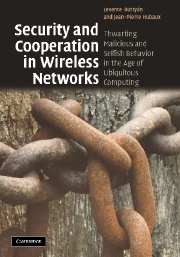 Security and Cooperation in Wireless Networks
Security and Cooperation in Wireless Networks from Part II - Thwarting malicious behavior
Published online by Cambridge University Press: 05 June 2012
Privacy means that one can control when, where, and how information about oneself is used and by whom. Privacy is not about hiding one's personal information from everybody else in the world. In fact, revealing personal information to authorized parties under well-defined circumstances can be very useful and should be made possible. For instance, assume that someone suffers an accident and she is transferred to the hospital in an unconscious state. In this case, it is quite useful if the medical doctors can look up her medical record in a database.
It is clear, however, that we do not want that everyone can access our medical record. In particular, employers and insurance companies should not have access to it. However, the problem is that once personal information has fallen into the wrong hands, we cannot control its use anymore. Therefore, hiding personal information from unauthorized parties is indeed very important. This is one of the most powerful (and sometimes the only) means to retain control.
Privacy is a problem that cannot be solved solely by technical means. For instance, there is no technical solution that guarantees that a misbehaving doctor cannot reveal sensitive medical data to an unauthorized party (e.g., an employer). Therefore, the problem is usually addressed with a combination of technical and legal means. In fact, the technical and the legal approaches can nicely complement each other. Problems that cannot be solved technically are often related to human behavior.
To save this book to your Kindle, first ensure [email protected] is added to your Approved Personal Document E-mail List under your Personal Document Settings on the Manage Your Content and Devices page of your Amazon account. Then enter the ‘name’ part of your Kindle email address below. Find out more about saving to your Kindle.
Note you can select to save to either the @free.kindle.com or @kindle.com variations. ‘@free.kindle.com’ emails are free but can only be saved to your device when it is connected to wi-fi. ‘@kindle.com’ emails can be delivered even when you are not connected to wi-fi, but note that service fees apply.
Find out more about the Kindle Personal Document Service.
To save content items to your account, please confirm that you agree to abide by our usage policies. If this is the first time you use this feature, you will be asked to authorise Cambridge Core to connect with your account. Find out more about saving content to Dropbox.
To save content items to your account, please confirm that you agree to abide by our usage policies. If this is the first time you use this feature, you will be asked to authorise Cambridge Core to connect with your account. Find out more about saving content to Google Drive.